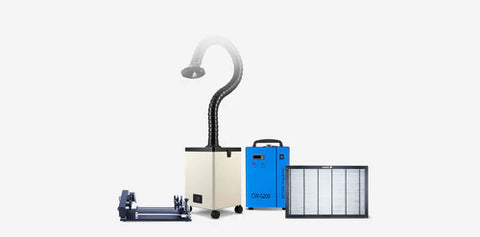Revolution in the laser engraving field: Achieving precise metal markings with OMTech laser marking powder
If you own a CO2 laser engraving machine, you can use it to engrave or cut leather and wood, but metals cannot be directly marked. This is because CO2 laser light is mostly reflected by metal. Even worse, the lasers reflected by metal surfaces can damage the laser head optics and protective covers. To expand the application range of engraving machines, OMTech has developed a laser marking powder that leaves a black mark on metal surfaces. A uniform layer, just thick enough to cover the metal color, is applied, and after drying, the metal surface can be engraved with the CO2 laser, creating a black mark.

How to use the laser marking powder?
Users simply need to add 99% industrial alcohol to the bottle up to the mark and shake well (or stir). The product does not need to be used all at once; before reusing, the lid should be tightly closed to prevent alcohol evaporation, and the product should be stored in a cool and dry place. If the ingredients settle after standing for a long time because the powder and alcohol do not mix, simply re-stir the mixture before use. The mixture is applied to the metal surface to be engraved using the provided brush. After a waiting period of 3 to 5 minutes, engraving can begin, which is then easily cleaned with water.

It should be noted that if high-concentration alcohol is not available, other volatile organic solvents can be used as substitutes, but under no circumstances should water be used. If the alcohol evaporates and only powder remains, alcohol can be added again in the same proportion and the mixture can be made ready for use by shaking or stirring.

Color development of the laser marking powder
The laser marking powder is not black, but it turns black only when exposed to a CO2 laser with a minimum power of 25 watts and a wavelength of 10.6 µm on metal surfaces. The special composition of the raw materials ensures that the powder converts the laser energy into heat. Through oxidative reduction reactions between the color powder and the metal surface, the oxidation state of the powder changes, it colors, and adheres permanently to the metal..
Influencing factors on the engraving quality
Layer thickness
In most cases, the thickness of your application affects the engraving quality. If the application is too thick, laser energy is lost before reaching the metal, which can lead to quality variations in the image. An optimal application just covers the metal color underneath. If the application is too thick, some alcohol can be added to achieve the right consistency. When using the spray, it should be sprayed evenly from a distance of about 20 cm.
Engraving parameters
Selecting the right engraving parameters is crucial for quality. It is recommended to use a laser engraver with at least 25 watts. Too low power can result in no color change. Additionally, appropriate speed and power settings are important. OMTech has simulated parameters for three types of metals as reference.
For example, with a 60-watt laser, slower speed and higher power can indeed produce good engraving results, but a strong laser beam can cause deformations in thin materials. Ideal parameters fall within the moderate range, such as a speed of 100 to 300 mm/s and a power setting of 40% to 80%. The exact parameters should be adjusted based on the machine and actual power output. If unsure about choosing the appropriate settings, a test should be conducted on the same metal material beforehand. The choice of the right line spacing or engraving pixels is also crucial. This parameter determines whether the image is clear and distinct. At a fixed speed of 150 mm/s and a power of 50% (with a 60-watt device), the results varied significantly with line spacing of 0.2 mm, 0.1 mm, and 0.05 mm, with 0.05 mm providing the best image quality. Of course, you should select the line spacing based on the size of the image to be engraved. However, if the image is large and the line spacing is very small, the engraving process may take longer.

The settings in the LightBurn software are depicted below:

Conclusion
To achieve a high-quality engraving, the powder and alcohol mixture should be evenly mixed and either sprayed or applied evenly. The choice of the correct engraving parameters is crucial. Before the actual engraving, a test should always be conducted on the respective metal to adjust the settings for optimal image quality if necessary.
Related Articles











































